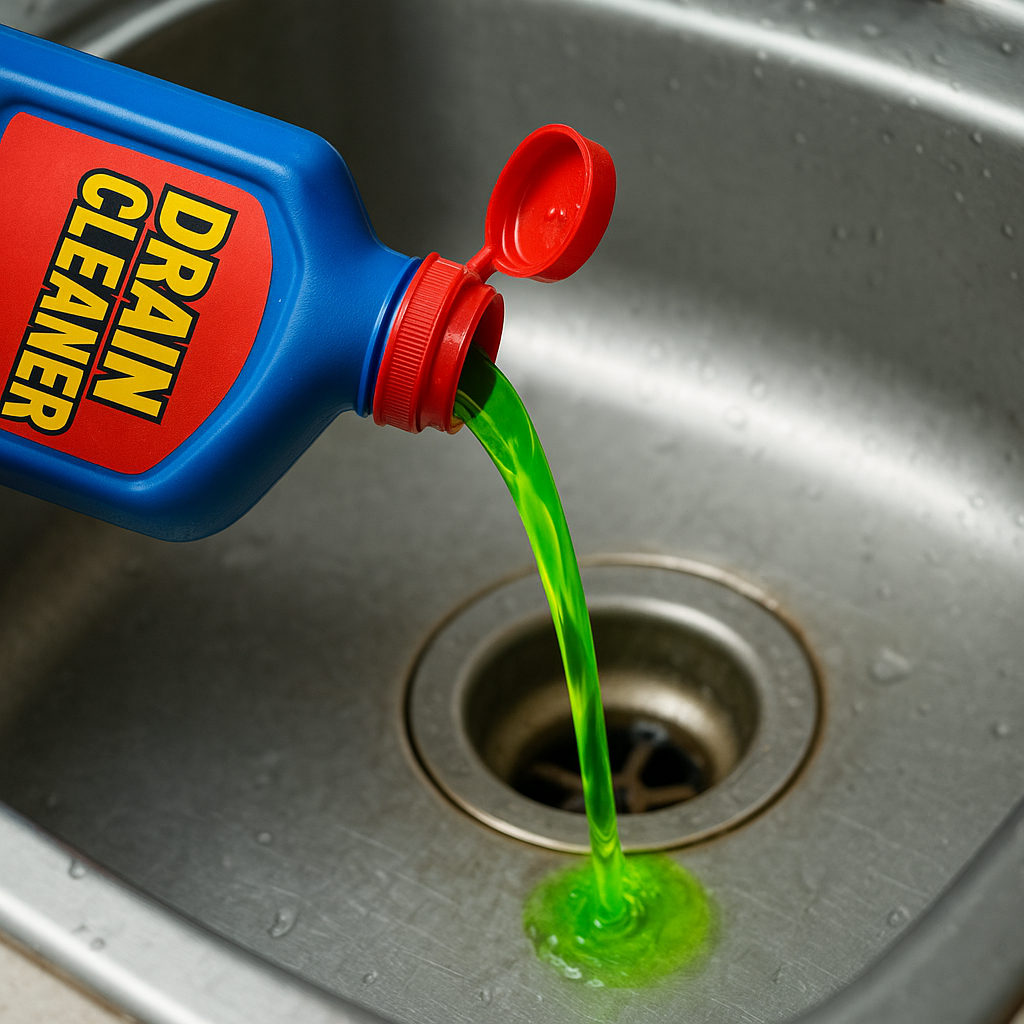The Risks of Using Chemical Drain Cleaners

Chemical drain cleaners seem convenient, but harsh formulas can damage piping and create irritating fumes. In older LA and Orange County homes, it’s smarter to clear clogs mechanically and protect finishes and traps.
Chemical Drain Cleaners: Why They’re Risky
- Pipe damage: Aggressive products can attack metals and seals.
- Indoor air concerns: Fumes may irritate eyes and throat, especially in small baths.
- Limited effectiveness: Solids, roots, and heavy buildup often resist chemicals.
Safer Ways to Clear a Clog
Start with a plunger and clean trap if accessible. For recurring issues, a pro can snake from the right access point, verify the cause with a camera, and recommend repairs that outlast chemical drain cleaners.
Reduce Future Blockages
Catch debris with strainers, dispose of wipes in the trash, and schedule periodic maintenance for long runs or tree‑lined lots.
Need a hand in LA or Orange County? Contact Plumbing Squad.
Key Takeaways
- Understand the essentials of the risks of using chemical drain cleaners so you can act quickly and avoid damage.
- Use safe, proven methods first; avoid shortcuts that create bigger problems.
- Prevent issues with routine maintenance and timely upgrades.
- Know when to call a professional to save time, money, and stress.
What Causes Clogs
Most clogs come from grease, soap scum, food particles, hair, and non‑flushable items. Older pipes with rough interiors or improper slopes make buildup worse.
Safe DIY Methods
- Boiling water flushes for grease‑based buildup in kitchen drains.
- Dish soap + hot water for light sink clogs.
- A cup of baking soda followed by a cup of vinegar; wait 10–15 minutes, then flush hot water.
- Use a drain snake (hand auger) to physically remove obstructions—never force it.
Avoid: mixing chemicals, over‑tightening traps, or forcing snakes that could damage pipes.
Prevention Checklist
- Use drain strainers in sinks and showers.
- Never pour fats, oils, or coffee grounds into sinks.
- Run hot water after washing greasy dishes.
- Schedule professional hydro‑jetting for persistent, multi‑fixture slowdowns.
FAQs
How can I prevent the risks of using chemical drain cleaners?
Start with routine maintenance: inspections, cleaning, and replacing worn parts before they fail. Address small issues early, use quality fixtures, and follow manufacturer guidelines. A yearly whole‑home check by a pro helps catch problems before they turn into the risks of using chemical drain cleaners.
Can DIY fixes make the risks of using chemical drain cleaners worse?
Yes. Using the wrong chemical, tool, or technique can damage pipes, fixtures, or finishes, and often pushes the problem deeper. Stick to safe methods and call a pro when you hit resistance, smell sewage, or see leaks.
When should I call a professional plumber for the risks of using chemical drain cleaners?
Call right away if there’s active leaking, sewage odors, recurring clogs, no hot water, water stains, or you’ve tried basic steps without success. Emergencies include burst pipes, backflows, and any leak near electrical.
How much does it typically cost to address the risks of using chemical drain cleaners?
Costs vary by scope, materials, access, and location. Expect a basic service call to start around a few hundred dollars, while larger repairs or replacements range higher. After an on‑site assessment, your plumber can provide a firm, written estimate.
Need a Reliable Plumber?
Plumbing Squad handles inspections, repairs, and emergency service with transparent pricing and clean workmanship. Call today or book service to get expert help fast.

